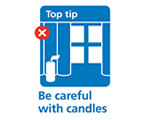 Go to main content
Go to main content
Archive Website of the UK government
Please note that this website has a UK government accesskeys system.
Main menu
Page menu
Home and community

Using candles, decorative lights and decorations safely

Candles, decorations and decorative lights are a growing cause of fires. By following these simple guidelines you can use candles safely. Find out how to reduce the risks caused by electrical decorative lighting and what lights to use inside and outside your home.
Using candles safely in your home
It is important to keep safety in mind whenever you use candles at home.
Lighted candles – where to put them
You should take care where you decide to put candles in your home. Candles are best placed:
- on a heat-resistant surface – be especially careful with night lights and tea lights, which get hot enough to melt plastic
- in a proper candle holder, so they don't fall over
- out of the reach of children and pets
- out of draughts and away from curtains, other fabrics or furniture, which could catch fire
- with at least 1 metre (3 feet) between the candle and any surface above it
- with at least 10 centimetres (4 inches) between any two candles
- away from clothes and hair - if there's any chance you could forget where a candle is and lean across it, put it somewhere else
Make sure you put out candles before moving them and don't let anything fall into the hot wax, like matchsticks.
Putting candles out
Never leave a candle unattended. Make sure you:
- put out candles before you leave a room and before you go to bed
- never leave a burning candle or oil burner in a child's bedroom
- use a snuffer or a spoon to put them out – blowing them can send sparks and hot wax flying
- double-check that they are completely out and not still smouldering
Candles and decorations for celebrations - fire safety
Candles and night lights are often used in celebrations for Christmas, Diwali and other festivals. Make sure you don’t put candles in, or by, a Christmas tree, plants, flowers or other foliage. You should also take care to keep ribbons, festive decorations made of tissue paper or cardboard, and greetings cards away from heaters, lights, fireplaces and candles.
Decorative lights and electrical safety
Fairy lights and Christmas tree lights don’t get used very often, so you should make sure they are in good working order before using them:
- check that lights aren't damaged or broken and look out for loose or worn wires
- check that the fuse in the plug is the right size – the lights' packaging should tell you the maximum size of fuse you should use
- don't overload sockets
- replace any bulbs that blow
- switch the lights off when you go to bed or leave the house
- don’t let the bulbs touch anything that can burn easily, like paper or fabrics and other Christmas tree decorations
If you are unsure about the safety of last year's Christmas lights, don't use them.
Indoor and outdoor decorative lights
For indoor lighting you could use light-emitting diode bulbs - they are usually called LED lights. LED lights work at a lower voltage than traditional bulbs so there is less risk of electric shock.
You can also buy Christmas lights with a low voltage transformer. The transformer reduces the normal voltage so the lights are safer to use.
If you want to use decorative lights outside, you should make sure they are designed for outdoor use only and are connected through an RCD-protected socket. A residual current device (RCD) protects against electric shock by disconnecting the electricity if the current is uneven. An RCD is sometimes called a safety switch or circuit breaker and costs about £10.
You should make sure you know where your fuse box is so that you can turn it off quickly in an emergency. A fuse box is sometimes called a consumer unit.
You can read more tips on seasonal electrical safety on the Electrical Safety Council website.
 Facebook
Facebook Twitter
Twitter StumbleUpon
StumbleUpon Delicious
Delicious Reddit
Reddit
